Month: March 2021
SAAET Project: Lockdown inspires new growth for young women in Nepal
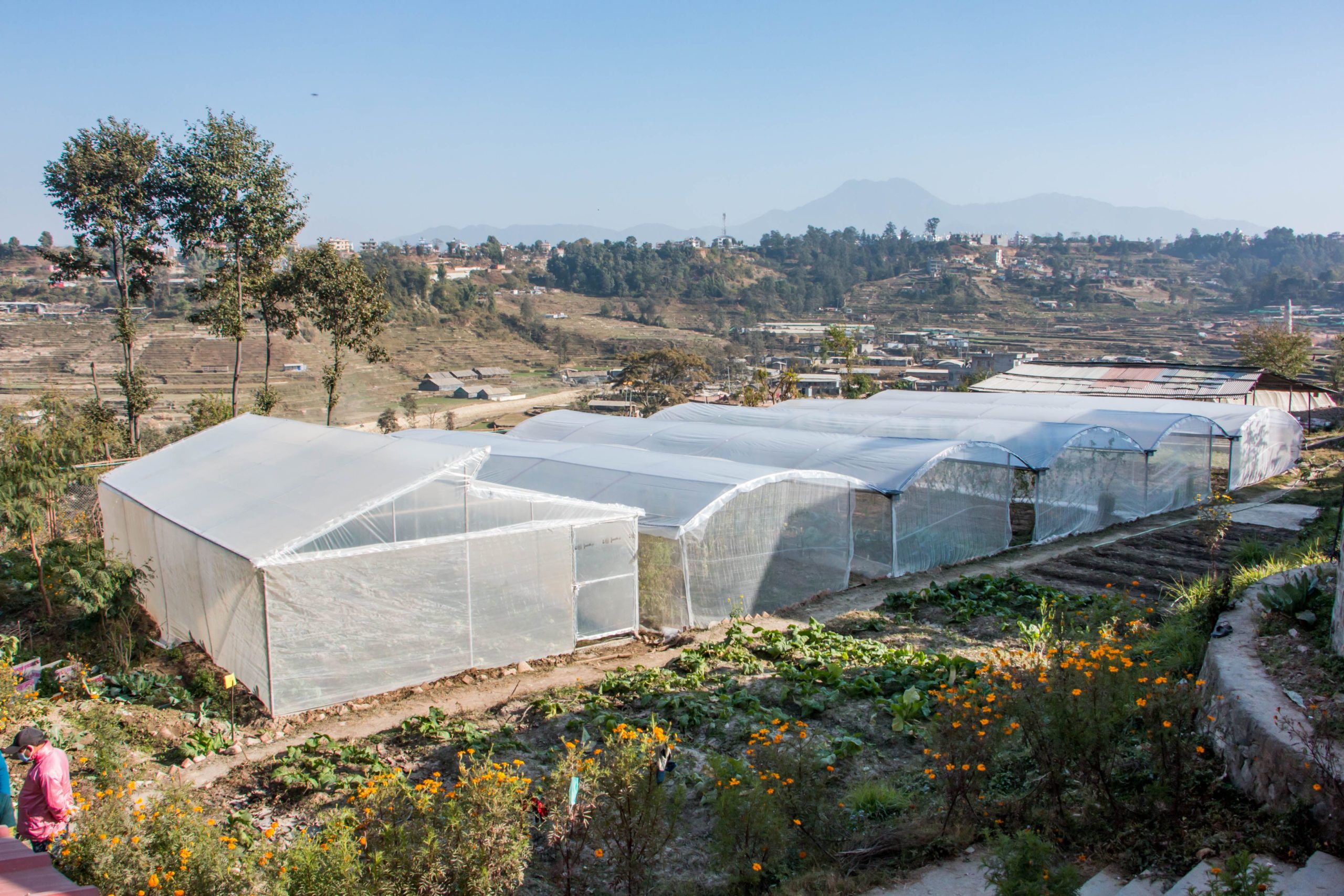
A letter from President Som Paneru
Dear NYF friends and family,
One year ago, just before the pandemic began, NYF was working to engage more women in our vocational education programs. We had seen that most of the young people interested in coming to Olgapuri Vocational School were young men—no matter how hard we tried to encourage young women to apply.
We reached out to families and learned that many young women were anxious about living near a big city like Kathmandu. Others insisted that even if they learned the skills offered—carpentry, plumbing, welding, and electrical—the pervasive culture of workplace sexism in Nepal would ensure they never truly advanced in a career. To these young women, the risks associated with these career goals were simply too great. As we worked to design an enriched program especially for them, the pandemic arrived. Olgapuri Vocational School was forced to shut its doors until further notice.
That is when the pandemic forced us to look at the problem differently.
During the lockdown, a generous donor helped us begin building a beautiful group of greenhouses on the Olgapuri grounds. As I oversaw the progress, I wondered—could we design a pandemic-safe vocational education program for young women that could bring greenhouse technology and training to their villages?
Greenhouses are relatively inexpensive to build and maintain, and can provide an enormous economic benefit to women in rural communities.
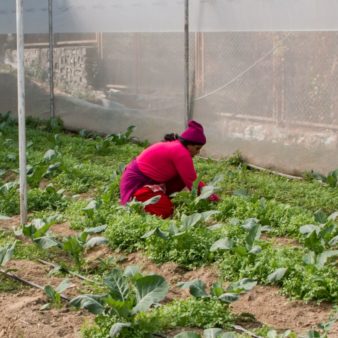
This is how the new SAAET Project was born. Saaet means “an auspicious moment of starting a new journey” – and it stands for Sustainable Agricultural and Entrepreneur Training.
Starting this spring, our greenhouse trainer will travel to rural villages to quarantine and then provide hands-on training to classes of 20 young women each. Students will learn the basics of organic farming, nursery techniques, construction and use of plastic greenhouse and drip irrigation, budgeting, bookkeeping, and more. By the end of the training, each woman will be prepared to manage her own greenhouse—feeding herself and her family with nutrient-rich vegetables, and often making extra income, even during a crisis.
Including the start-up materials for each girl’s fully-functional greenhouse, the project’s cost per village is $7,500. In our first year, we hope to bring the SAAET Project to five villages—or 100 young female entrepreneurs.
I am so grateful for the loving support that has made this project possible during an unprecedented crisis. Your gifts are helping Nepalese young people build towards better health and brighter futures.
Dhanyabad,

Som Paneru
President
Our U.S. Office is Moving!

Our U.S. team is excited to announce that we’re moving from our Sausalito office to a beautiful space in San Francisco! Here’s our new address, effective immediately:
Nepal Youth Foundation
1016 Lincoln Blvd, Suite 222
San Francisco, CA 94129
Please update your records and discard any old donation envelopes with our old address attached to ensure any mail reaches us successfully! Our phone number will remain the same at 415-331-8585.
The new office, at the Tides Converge, is part of a collaborative workspace owned by a nonprofit and reserved especially for nonprofits. A major perk is lower rent, which will allow us to stretch each thoughtful gift further than ever to support Health, Shelter, Freedom, and Education for the children we serve!
NYF’s U.S. team is looking forward to the day when we leave COVID behind. We’re so excited to welcome partners, donors, friends, and other members of the NYF Family to our new home!
Please email us at info@nepalyouthfoundation.org if you have any questions about our new space.

The Tides Converge is in The Presidio of San Francisco. Click here to see it on Google Maps!
CASHE Presents “Women of Nepal”
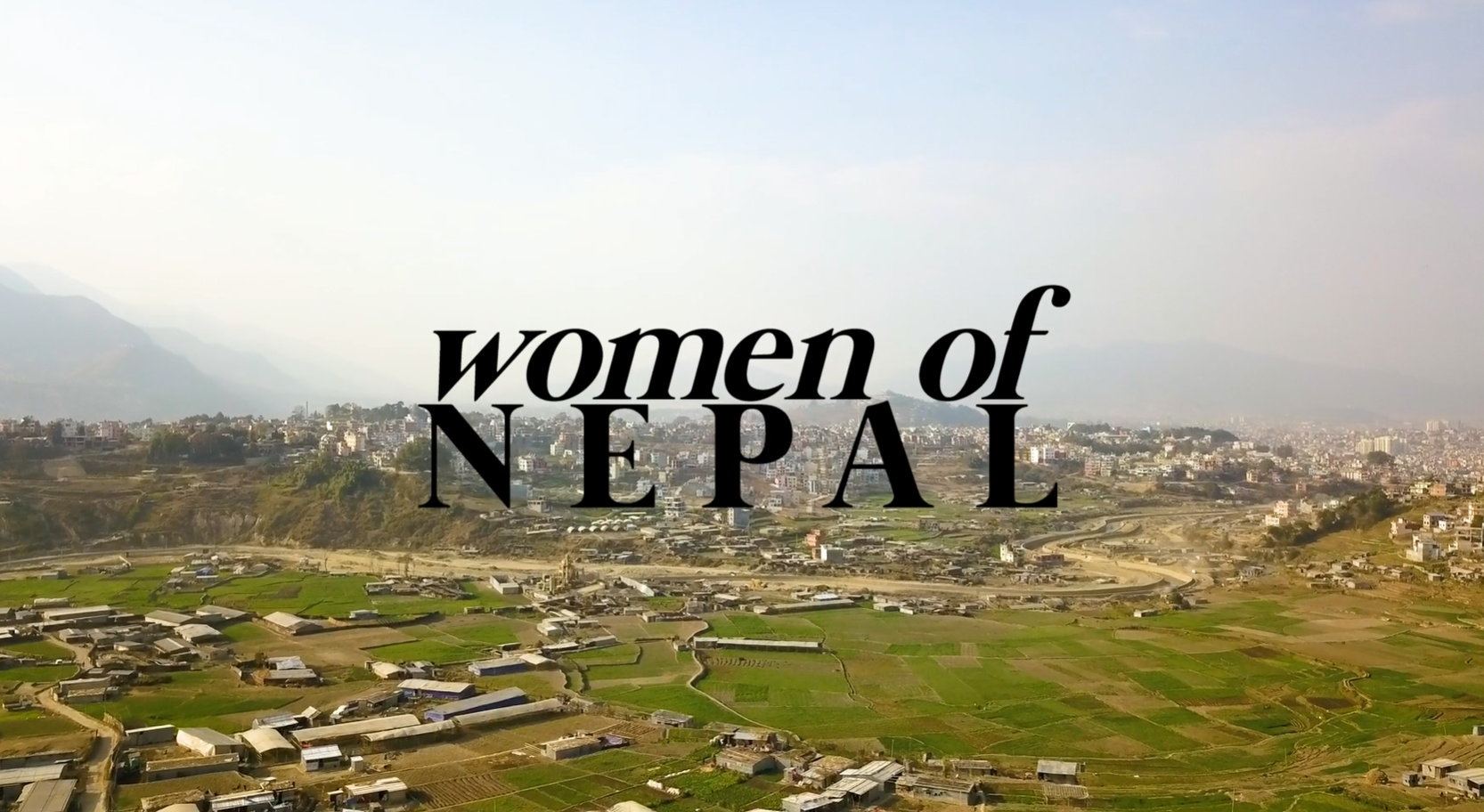
“Women of Nepal,” a short film produced through a partnership between multimedia journalist Rajneesh Bhandari, CASHE, and NYF, was released on International Women’s Day—March 8th, 2021. The film showcases the intersection of livelihood and motherhood for two profound women: one woman proudly supported by NYF’s foundational efforts and another working in manufacturing to produce CASHE cashmere.
We are so proud to share “Women of Nepal” with you now!
Cashmere Crafting
Sunita Maharjan, a craftswoman and mother of twins, has an undying passion for textiles and the cultural value Nepali garments carry across borders. This love for her trade is driven by more than skill; her children’s pride in her craft make it something to be done with dignity.
“Many people have the concept that women should do only household chores, but I don’t feel that way,” Sunita noted. “I feel very happy to know that the products we make are exported. Sometimes when I watch fashion shows on television I see people wearing dresses similar to what we make. It makes me very happy as I also make similar dresses.”
We at NYF are so grateful for partners like CASHE, who are truly devoted to elevating the remarkable craftspeople behind the luxury cashmere they bring to the international market. CASHE donates 10% of every purchase to NYF, and wherever possible, they use their press coverage to highlight the valuable work NYF does for Nepalese children.
CASHE was briefly featured in Sage & Sound recently, as well as on the Bri Books Podcast (CASHE/NYF are talked about at the 3:25 minute mark). CASHE is even featured in the April 2021 Issue of British Vogue!
Nutritional Rehabilitation Homes
Sangita Bhusa, a mother of two who has overcome tuberculosis, is forever grateful for the care she received from the Nepal Youth Foundation’s Nutritional Rehabilitation Home. Working since the age of seven, Sangita has overcome many difficulties supporting herself and her children. She returned to work a mere fifteen days after the birth of her first child.
“My mother suggested that it is better to work than to die of hunger. That is how I started working from an early age,” Sangita shared.
Sangita is just one of hundreds who benefit every year from the intensive nutritional care offered at NYF’s Nutritional Rehabilitation Homes (NRHs).
According to UNICEF, malnutrition contributes to over half of all child deaths in Nepal. NYF is working to combat that grim statistic with Nutritional Rehabilitation Homes built to accommodate malnourished patients discharged from nearby hospitals.
Before the development of NRHs, the Nepalese hospital system was not equipped to provide the long-term, holistic care needed to address chronic malnutrition in patients. Malnourished children were treated for acute illness and then discharged—often to continue suffering the long-term complications of malnutrition.
At NRHs, children are provided with holistic medical and nutritional care until they have reached a healthy weight. Meanwhile, their caregivers are trained in preparing delicious, nutrient-rich meals using locally-available, affordable ingredients tailored to their own home regions.
NYF has built a total of 17 Nutritional Rehabilitation Homes, including our flagship in Kathmandu Valley, which will remain under NYF control. The remaining 16 were designed to gradually transition into the government-run health system itself. So far, 15 have successfully made this transition, with the last, on track to transition in 2022. Training for NRH staff members takes place at the Kathmandu Valley flagship, which is well-known in the region as a valuable educational asset for anyone specializing in childhood nutrition.
Dhanyabad, CASHE!
We are so grateful to CASHE for highlighting our valuable nutrition programming in “Women of Nepal”! To learn more about our partnership with CASHE, please read our partnership announcement here and our spotlight on Nepalese cashmere here.
You may also visit CASHE’s online shop here.
To support the cautious reopening of NYF’s important nutritional programming, including our Nutritional Rehabilitation Home in Kathmandu Valley, please consider making a thoughtful gift today! Make sure your #LoveWorks for the women of Nepal… and their children, too!
Female Lawyers – A New Milestone for the Freed Kamlari Community
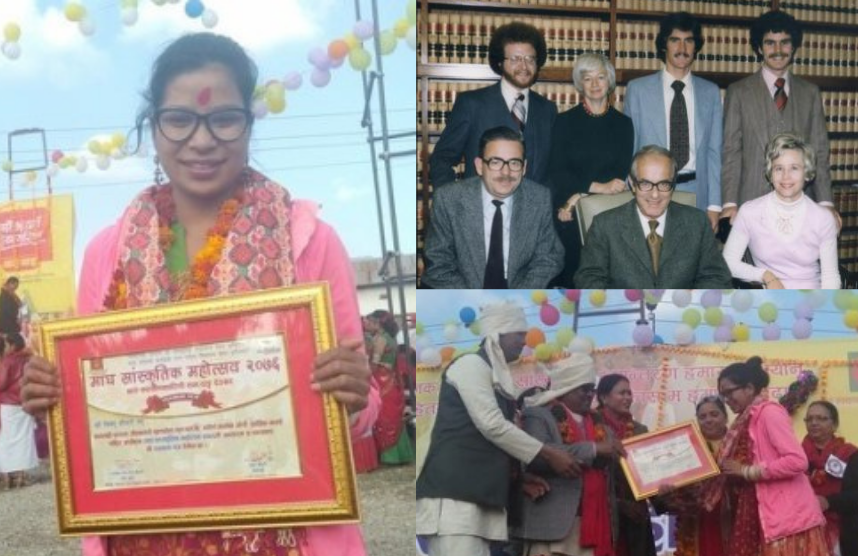
Female lawyers hold a special place in my heart—especially those embarking on this challenging career in a time and place in which women are not always welcome.
For those who do not know me, welcome! I am Olga Murray, the founder of Nepal Youth Foundation. Since the mid-1980s, I have dedicated my life to helping the children of Nepal to achieve their dreams. The work is an incomparable joy! Many of these kids’ successes have absolutely astonished me.
I have recently learned from Som that Bishnu Chaudhary has passed the bar exam in Nepal. This makes her the first Freed Kamlari to become a lawyer.
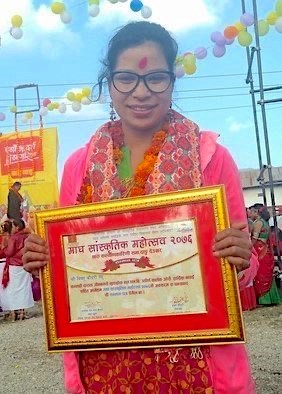
Kitchen Slavery
Bishnu’s father sold her into kamlari bondage when she was ten years old. Initially, he needed her wages to pay off a debt of under $40 (at the current rate of exchange), and later to assure that he could continue to work as a farmer for her employer. If she had stopped working, her family would have been left with no land to farm—and no way to feed themselves.
As a kamlari servant, Bishnu was denied an education and was instead forced to spend her childhood working long hours doing laundry, dishes, housework, and other tasks assigned by her family’s landlord. It was hard, demeaning work in an unforgiving environment. This was no place for a child.
(You can learn more about the kamlari practice, and NYF’s response, here.)
Rescue & Education

NYF rescued Bishnu from kamlari bondage in 2004, as our Indentured Daughters program (later the Empowering Freed Kamlari program) began to take root in the impacted Tharu communities.
She wanted desperately to go to school, and though her father at first refused, the teachers at the local school convinced him to allow her to enroll. Bishnu proved to be an outstanding student throughout her school years, taking as many opportunities for growth and development as she could. NYF has proudly supported her education from the beginning. Bishnu was admitted to law school in Kathmandu and graduated last year (pictured above).
Social Activism
During her student years, Bishnu was an outspoken and passionate leader in opposing the practice of kamlari, leading rescue operations of indentured children and convincing parents not to send their daughters away. She even risked being expelled from school because she insisted on liberating kamlari who were working for her own headmaster and teachers. Now that’s courage!
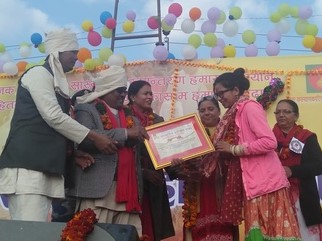
At Maghe Sankranti 2020, before the pandemic, Bishnu’s local government presented her with an award for the work she has done for her community (pictured left). I am gratified to see the ways these women, once mistreated and made to feel worthless, are being recognized and honored for their remarkable achievements.
Bishnu has continued in her activism, providing counseling and advice for former kamlari. Her aim is to advocate for girls and women in all aspects of the law – a tall order in Nepal, where paternalism reigns supreme.
A New Milestone

Female lawyers are a new phenomenon for Bishnu’s ethnic minority community, the Tharu. But Bishnu is just the first in the pipeline.
Up next is Urmila (left), the leader and heroine of the anti-kamlari movement, who was indentured at the age of six and did not begin school until she was 18, against the advice of almost everybody. Urmila is in her second year of law school and intends to work in the area of human rights, particularly women’s rights, after graduation.
How exciting to know Tharu women will have powerful female lawyers representing them in Nepal, and showing young girls what women can accomplish!
International Women’s Day 2021
I identify with these young women because, although I have never been sold into indentured servitude, I know the difficulty of embarking on a career in which women were not always welcome. I graduated from law school 66 years ago (gulp!), becoming a female lawyer at a time when there were few women in the profession, and the prospect of looking for a job was terrifying.
I was honored to spend my career in the company of those working to advance the rights of minorities in the United States. Below, I stand with my colleagues as a research attorney for California Supreme Court Justice Stanley Mosk.
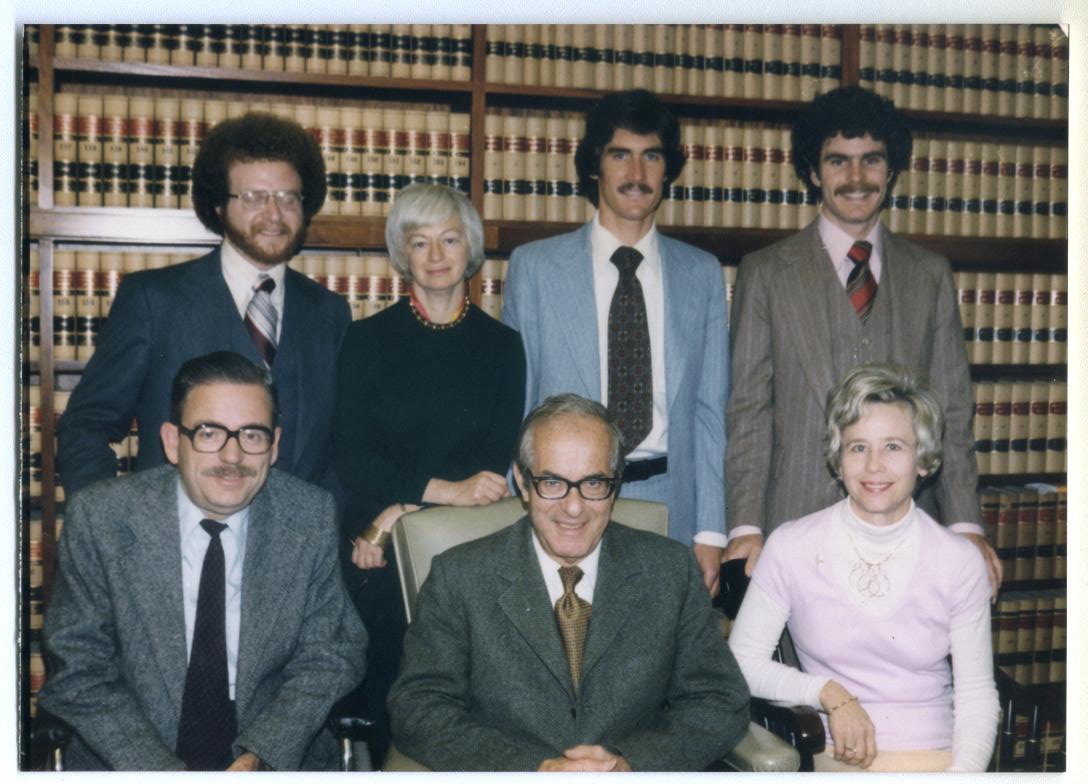
International Women’s Day, now held on March 8th, has been celebrated since 1911, when it was organized in Europe. Women then were campaigning for women’s rights to work, vote, be trained, hold public office, and end discrimination. Other early causes involved labor legislation about safety standards and child labor, combatting violence against women, and agitation for peace.
Now, this day is an opportunity to celebrate women’s achievements, raise awareness about women’s equality, and lobby for change.
The International Women’s Day theme in 2021 is “Choose to Challenge”—something the NYF Family has been doing for over 30 years, and something the Freed Kamlaris have done with gusto.
The work isn’t finished—but change is coming, one milestone at a time.
Today, for the Freed Kamlari communities, Bishnu, Urmila, and other daring women are choosing to challenge the status quo in their countries. I have full confidence that both Bishnu and Urmila will succeed in their goal to improve the status of women in Nepal because of their determination, their smarts, and the lessons they learned in their struggles to overcome injustice.